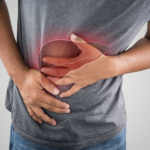The symptoms of colon cancer are often not clear in the early stages, which is why detecting the early signs is extremely important, as early diagnosis means more successful treatment.
When colon cancer first develops and is still small, it often does not cause any symptoms. The symptoms can also be subtle and may not necessarily make the patient feel uncomfortable.
As the tumor grows, the symptoms and signs can vary, depending on the location of the tumor.
Here are the top 5 most common early symptoms of colon cancer, as listed by Patient.info:
1. Bleeding from the tumor
There may be blood mixed with the stool. Sometimes the blood can make the stool turn black.
Bleeding is usually not severe and in many cases, it goes unnoticed, as it is just a small amount mixed with the stool.
However, frequent small amounts of bleeding can lead to anemia, making the patient feel tired and pale, according to Express.
2. Stool having more mucus than usual
The Mayo Clinic advises that if there is a small amount of mucus in the stool, it is usually not a cause for concern. The stool normally contains a small amount of mucus – which has the purpose of keeping the mucous membrane of the colon moist and lubricated.
Patient.info advises, “Seek medical attention if you notice an increase in the amount of mucus in the stool.”
3. Changes in bowel habits
This means having more or fewer bowel movements than usual, experiencing diarrhea or constipation.
4. Feeling “incomplete” after a bowel movement
According to The Royal Marsden NHS Foundation Trust, this is quite common if the tumor is located in the rectum, according to Express.
5. Abdominal pain

Abdominal pain is also the most common early symptom Photo: Shutterstock |
The UK National Health Service (NHS) states that persistent lower abdominal pain, bloating, or discomfort can be a sign of the disease.
As the tumor develops in the colon or rectum, the symptoms can become more severe.
According to Patient.info, similar symptoms as above, but more severe, include:
• Generally feeling unwell, tired, or experiencing weight loss.
• If the cancer is large enough, it can cause a blockage in the colon. This leads to severe abdominal pain and vomiting.
• Sometimes, the cancer creates a hole in the colon or rectum wall, causing the stool to leak into the abdomen, resulting in severe pain.
It is important to note that these symptoms are not always related to colon cancer.
Bloody diarrhea with mucus can be a sign of inflammatory bowel disease.
However, if you experience any of the above symptoms, regardless of the cause, it is recommended to seek medical attention.
The UK Cancer Research UK advises not to hesitate if you feel worried about the symptoms. These symptoms may not be caused by colon cancer. But if they are, the chances of successful treatment are higher. It will not waste time.
What increases the risk of colon cancer?
Diet is one of the risk factors for developing colon cancer.
Several studies have shown that eating a lot of red and processed meat can increase the risk of the disease, so it is advisable to replace it with chicken or fish.
You can also try eating beans instead of meat.
Eating a diet high in fiber can also reduce the risk of colon cancer, according to Express.
You may also like
Exploring the Use of Birth Control Pills for Acne Treatment
Are you curious about the advantages and disadvantages of taking daily birth control pills? Do women who take them experience better looking and feeling skin during their periods? DienmayXANH.com is here to discuss all of these questions and list all of the potential pros and cons of using birth control pills!





































